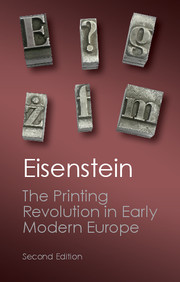Book contents
- Frontmatter
- Contents
- List of Illustrations and Maps
- Preface to the Second Edition
- Introduction
- THE PRINTING REVOLUTION IN EARLY MODERN EUROPE
- PART I THE EMERGENCE OF PRINT CULTURE IN THE WEST
- PART II INTERACTION WITH OTHER DEVELOPMENTS
- Afterword: Revisiting the Printing Revolution
- Selected Reading
- Index
Introduction
Published online by Cambridge University Press: 05 October 2013
- Frontmatter
- Contents
- List of Illustrations and Maps
- Preface to the Second Edition
- Introduction
- THE PRINTING REVOLUTION IN EARLY MODERN EUROPE
- PART I THE EMERGENCE OF PRINT CULTURE IN THE WEST
- PART II INTERACTION WITH OTHER DEVELOPMENTS
- Afterword: Revisiting the Printing Revolution
- Selected Reading
- Index
Summary
I do ingenuously confess that in attempting this history of Printing I have undertaken a task much too great for my abilities the extent of which I did not so well perceive at first.
Joseph Ames, June 7, 1749I first became concerned with the topic of this book in the early 1960s after reading Carl Bridenbaugh's presidential address to the American Historical Association. This address, which was entitled “The Great Mutation,” belonged to an apocalyptic genre much in vogue at that time (and unfortunately still ubiquitous). It raised alarms about the extent to which a “run-away technology” was severing all bonds with the past and portrayed contemporary scholars as victims of a kind of collective amnesia. Bridenbaugh's description of the plight confronting historians; his lament over “the loss of mankind's memory” in general and over the disappearance of the “common culture of Bible reading” in particular seemed to be symptomatic rather than diagnostic. It lacked the capacity to place present alarms in some kind of perspective – a capacity which the study of history, above all other disciplines, ought to be able to supply. It seemed unhistorical to equate the fate of the “common culture of Bible reading” with that of all of Western civilization when the former was so much more recent – being the by-product of an invention which was only five hundred years old. Even after Gutenberg, moreover, Bible reading had remained uncommon among many highly cultivated Western Europeans and Latin Americans who adhered to the Catholic faith.
- Type
- Chapter
- Information
- The Printing Revolution in Early Modern Europe , pp. xiii - xxPublisher: Cambridge University PressPrint publication year: 2012

